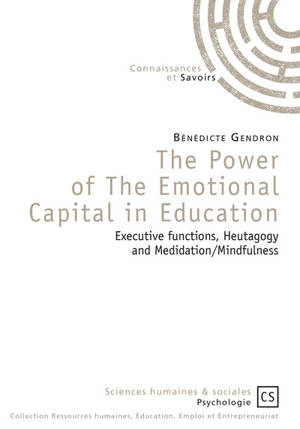
- Retrait gratuit dans votre magasin Club
- 7.000.000 titres dans notre catalogue
- Payer en toute sécurité
- Toujours un magasin près de chez vous
- Retrait gratuit dans votre magasin Club
- 7.000.0000 titres dans notre catalogue
- Payer en toute sécurité
- Toujours un magasin près de chez vous
The power of the emotional capital in education
executive functions, heutagogy and meditation-mindfulness
Bénédicte GendronDescription
The Power of The Emotional Capital in Education
The emotional capital (EK), this powerful functionning capital which was missing in economics measurement, is the capital driving heart, mind, soul and behaviours which could changes the world by changing ourselves. It's a three levels economics' concept (micro, meso and macro). Developed by Gendron in the early 2000s, the « Emotional Capital is the stock of the personal and social competencies that is inherent in the person, useful for personal, professional and organizational developments, and participates to social cohesion and has global and personal, economic and social returns ». Activating executive functions, the emotional capital is developed by active positive and collaborative pedagogy (heutagogy) and by practising mindfulness and meditation, bringing back the joy of learning by collaborative and creative learning, re-enchanting teaching. As a means of production, society contribution and personal developments, each additional investment in EK yields additional outputs at the three levels helping at performing better socially, economically and personally. In eudaimonic economics, the EK participates not only to the socio-economic growth but also to the society' cohesion and happiness as environmental concerns, underlying the relevance of education for the social and economic welfare, and the environmental protection. Thus, there is an emergency to invest in Emotional Capital to follow Mandela's mottos, to fulfill Sen's lifetime achievement and development as freedom and feed Gandhi's empowerment and emancipation, to allow a Better World.
Spécifications
Parties prenantes
- Auteur(s) :
- Editeur:
Contenu
- Nombre de pages :
- 133
- Langue:
- Anglais
Caractéristiques
- EAN:
- 9782342163421
- Date de parution :
- 01-10-18
- Format:
- Livre broché
- Dimensions :
- 140 mm x 200 mm
- Poids :
- 204 g

Les avis
Nous publions uniquement les avis qui respectent les conditions requises. Consultez nos conditions pour les avis.






